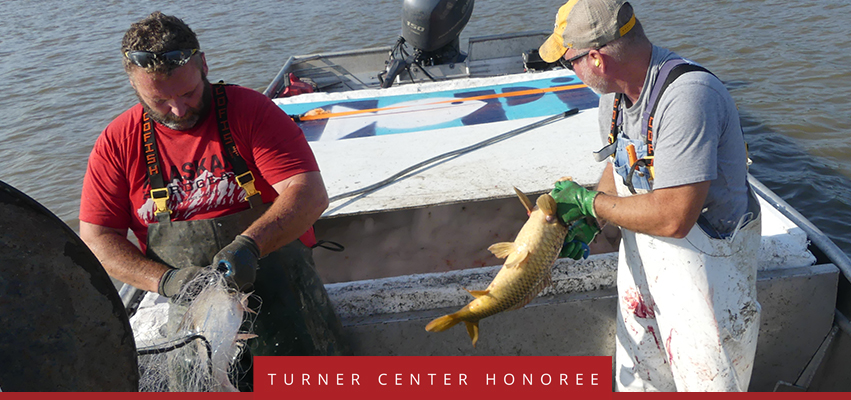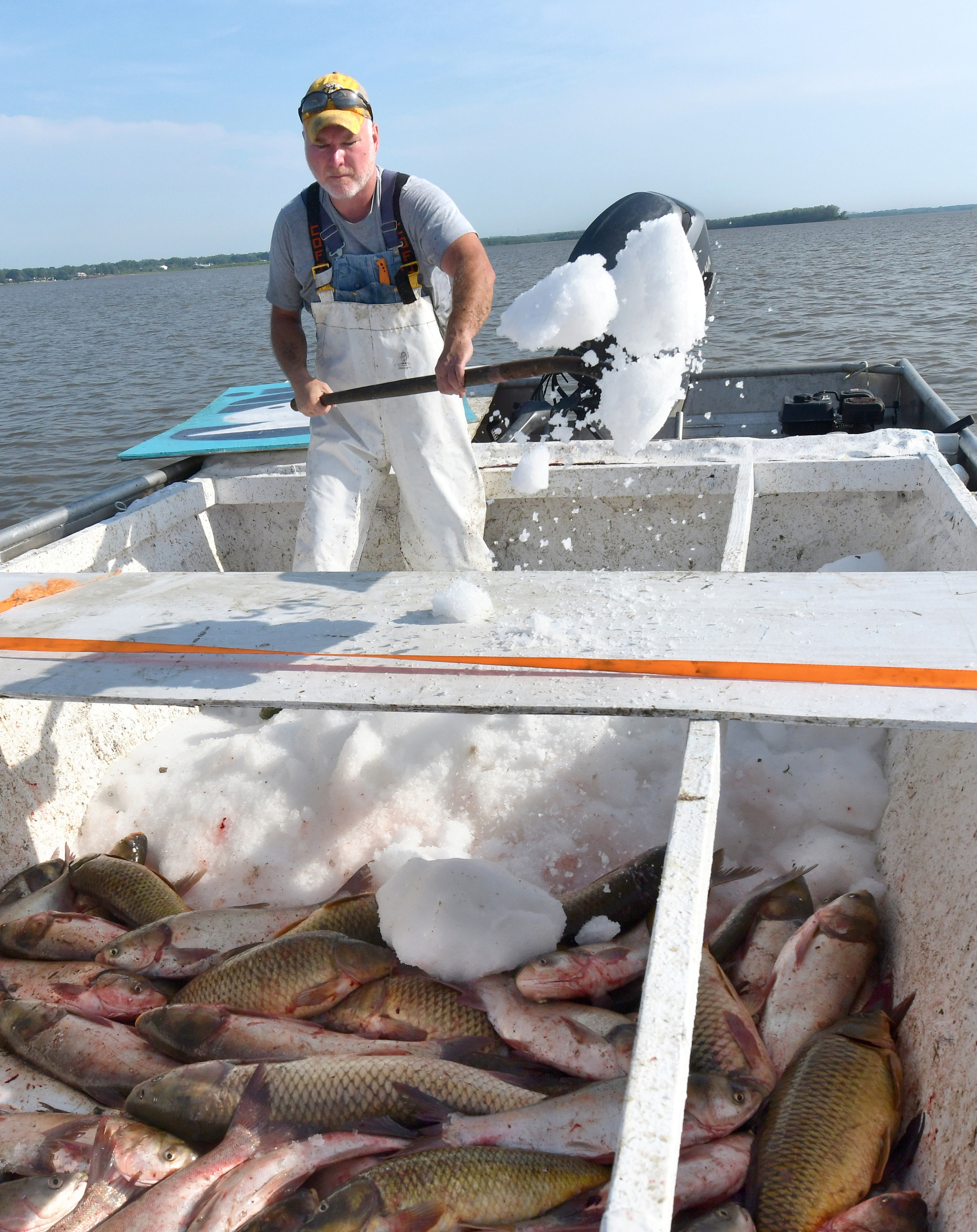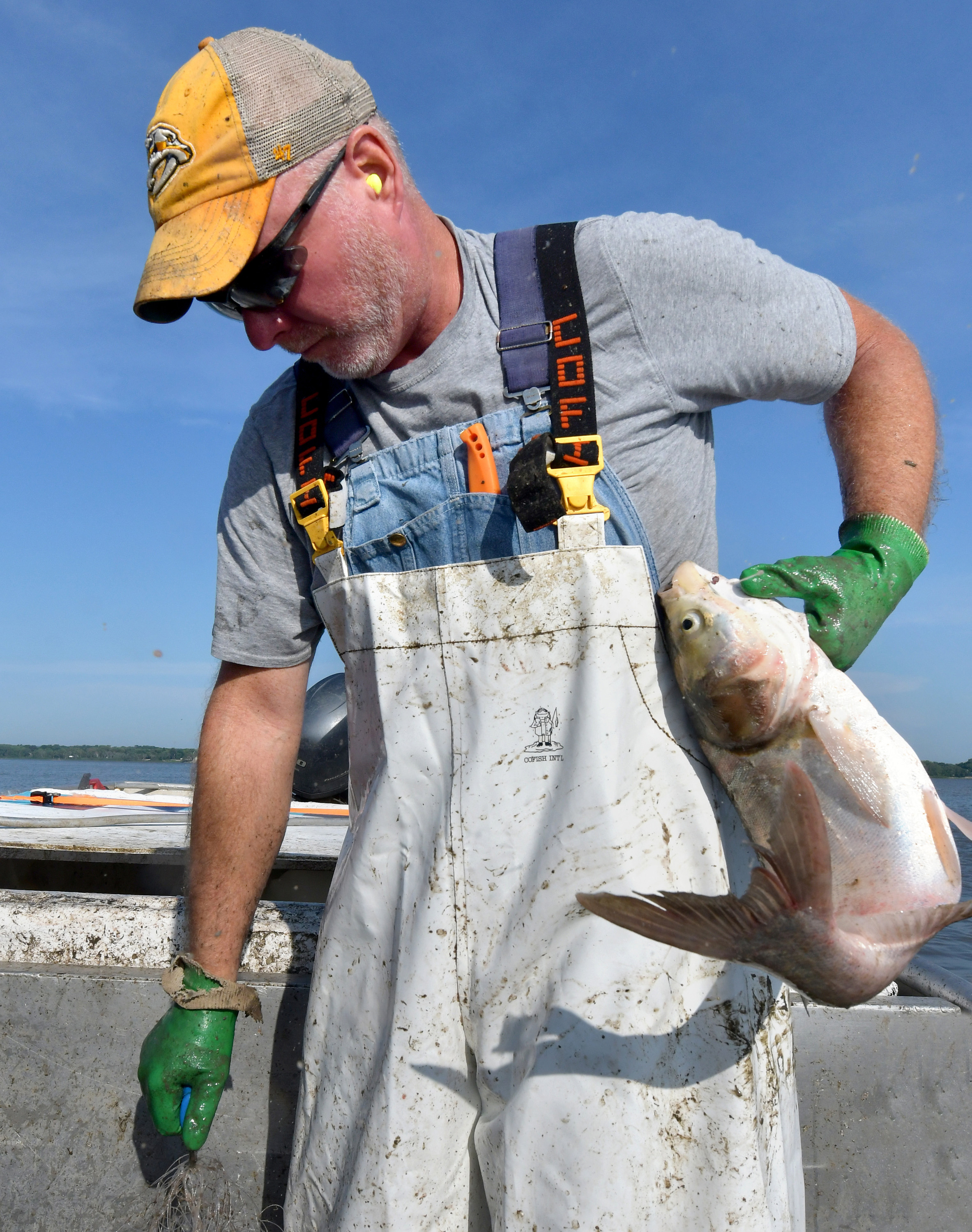If Asian carp have a heaven, it’s the Illinois River. So many silver, grass, bighead and black carp want to make a life for themselves and their large families in the warm, shallow waters here, in fact, that they have been designated an invasive species.
Aiming to put a dent in that population and derive a decent income doing it would seem a no-brainer, then, for some aspiring entrepreneur.
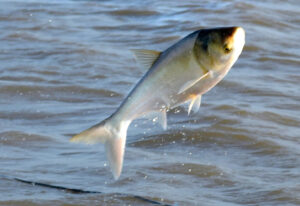
As it turned out, those entrepreneurs were right here in Roy Sorce and his management team of Jared Vogel and Diana Spiewak, who as CEO, COO and CFO, respectively, have pursued their environmentally conscious ambitions to begin building a promising fish harvesting and processing operation. Their venture has grown so much, so quickly since launching in 2020 that Sorce Freshwater, a subsidiary of Sorce Enterprises in East Peoria, is the Turner Center’s New Exporter of the Year for 2022.
Rarely does a business check off so many potential “winner” boxes.
So far, it’s been a winner for Sorce, which was seeking a new business line after 50 years in the food distribution industry, supplying Kentucky Fried Chicken, Taco Bell, etc., and found one.
It’s a winner for those who work the waters, the fishermen who needed a dependable market to buy their catches; a richer, more reliable source of income; and a life that didn’t have them on the river 24-7 just squeaking out an existence.
It would seem a winner for the environment, for the ecosystems of the Illinois River and Great Lakes, as the more carp pulled out of the waterway here means fewer infiltrating Lake Michigan and beyond.
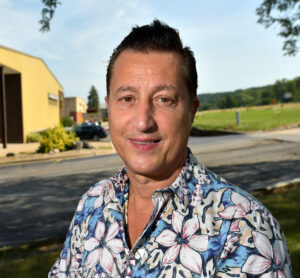
It could be a winner for taxpayers, who otherwise are about to spend nearly $900 million on a lock-and-dam project on the Des Plaines River to keep the species out of the Great Lakes.
It looks to be a winner for central Illinois, which now has another viable, growing employer.
It’s a winner for a hungry world in need of an abundant, inexpensive source of protein.
It could be a winner for savvy investors who want a piece of the action as Sorce embarks upon an ambitious five-year expansion plan.
It all pretty much happened by accident. Sorce, 63, and his team were looking to branch out into the cannabis industry in East Peoria two years ago when local officials asked if they’d put an ice-making machine in their warehouse of 65,000 square feet just off Route 116.
“What for?” Sorce asked. Well, central Illinois fishermen needed a convenient supply of ice to keep their catches fresh and usable for buyers. With the pandemic putting his cannabis plans on hold, Sorce began doing his due diligence, saw an opportunity, and created the Midwest Fish Co-Op – basically a “Prairie Farms for fishermen.”
“They’d support us if we supported them,” he said.
The dozen he originally brought on board as independent contractors have grown to 30, complementing 10 payroll employees. While the average pay is about $40,000, the highest grossing fisherman in 2021 made $120,000 just from Sorce, with another $50,000 in state subsidy payments.
They’re already pulling 8 million pounds of fish out of Peoria Lake annually, with the potential to nearly double it. Another 50 million catchable pounds is swimming between Bartonville and Havana.
While the company continues to pursue its “cannabis conservatorium” in East Peoria, which has gained traction of late, what they’ve discovered is that the fish likely have more bottom-line potential.
“If you look at the data, this is where you want to go,” said Vogel. “You don’t want all your eggs in the cannabis basket … The scale of what this (carp) business could do is the McDonalds corporation, whereas the cannabis is a McDonald’s store.”
Indeed, there’s less competition, the carp are a renewable resource – a female can lay up to 5 million eggs — little government regulation exists, and there are seemingly countless uses for the product beyond food.
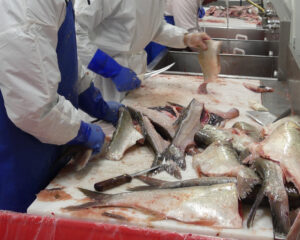 Indeed, carp can be turned into pet treats – “caviar for your dog” – pharmaceuticals and other medical applications, cosmetics, fashion (“fish leather” for purses and shoes), commercial bait, highway aggregate, fertilizer, etc. The company has been in conversation with Belushi’s Farm, famed actor Jim Belushi’s operation in Oregon, which needs fertilizer.
Indeed, carp can be turned into pet treats – “caviar for your dog” – pharmaceuticals and other medical applications, cosmetics, fashion (“fish leather” for purses and shoes), commercial bait, highway aggregate, fertilizer, etc. The company has been in conversation with Belushi’s Farm, famed actor Jim Belushi’s operation in Oregon, which needs fertilizer.
Every last piece of the fish can be used – meat, scales, skin, bones – consistent with the company’s commitment to “blue economy” principles: “What that means is when we use the fish out of the river, we’re including everybody in our mission to do it ethically, efficiently and effectively, with green energy and zero waste,” said Vogel.
Alas, carp have gotten a bad rap – at least in the U.S. – over the years.
“Most people think they’re dirty bottom feeders, but they’re not,” said Sorce. “They’re filter feeders, plant and algae eaters, mid-water feeders.”
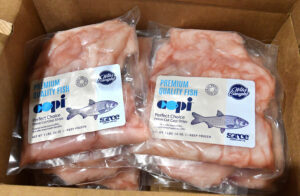 Carp are a white meat high in omega-3 fatty acids and low in mercury and other contaminants. The fish is flaky, mild in flavor and adaptable to multiple cuisines. Meanwhile, it is made in the U.S.A., which is important to many consumers.
Carp are a white meat high in omega-3 fatty acids and low in mercury and other contaminants. The fish is flaky, mild in flavor and adaptable to multiple cuisines. Meanwhile, it is made in the U.S.A., which is important to many consumers.
“Like farm to table, it’s river to table,” said Sorce. And unlike the fish we buy at the big chains, at Sorce they tell you “where it was caught, when it was caught, when it was processed, where it was stored, how it got to you,” said Vogel.
The fish now is on the menu as “copi” at some upscale Chicago restaurants – notably Frontier and Ina Mae Tavern – and at Kelleher’s in Peoria. The rebranding of carp to “copi” – short for “copious” – has been a nice government assist.
The demand has skyrocketed, meaning that Sorce Freshwater is paying the bills and then some, hitting “true BEP” – break-even point – “in less than a year. That’s like lightning fast,” said Vogel.

Meanwhile, with the help of the Turner Center, the company has identified significant foreign markets for its product in China, the Dominican Republic, Israel, the United Kingdom, UAE, Canada and Africa, and that’s likely to increase.
As a result, the company is eager to expand and “looking for investors” – ideally local ones — with a tiered growth plan depending on how much is raised. If there’s a downside to carp, it’s bony, and the equipment necessary to process it is expensive. Sorce also intends to go all in, from catch to processing, package to transport.
For Clint Carter and Dave Buchanan, up at dawn and out on the river, it’s a dream come true. They cast 1,200 yards of netting on a scenic, cleaner, and they believe more diverse river – it seems there are more buffalo, walleye, pike — that can be fished 11 months of the year. The hauls are bigger in winter – 8,000 pounds is a good day’s reward — when the carp are sluggish, but on this summer day they’re jumping, some into the johnboat itself.
Carter starts his day in Springfield, where he has a fish market. For Buchanan, retired from the Peoria Police Department and still in law enforcement, this is a part-time gig.
“It’s a great opportunity for a lot of guys” – and a few gals, too – said Buchanan.
And Roy Sorce is committed to them — and to central Illinois.
“Why would I leave when the river’s right here? Location, location, location,” said Sorce, who is quick to thank those – Turner and Bradley, IDNR, the Tri-County Regional Planning Commission, the EDC, Western Illinois University, University of California Davis, etc. – who have helped get the company to this point.
“There’s so much potential.”



